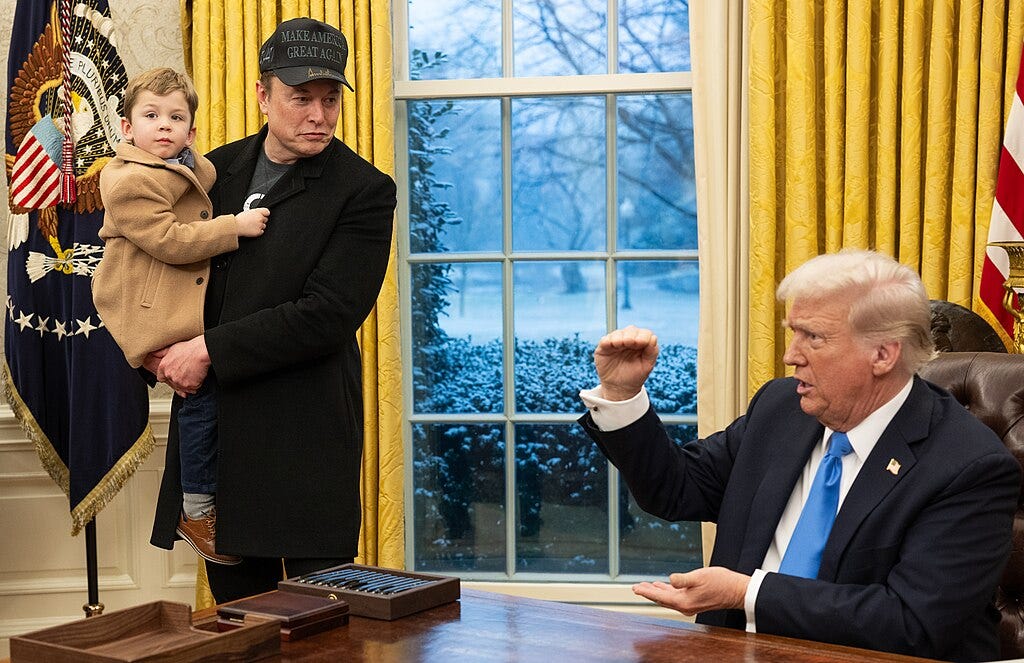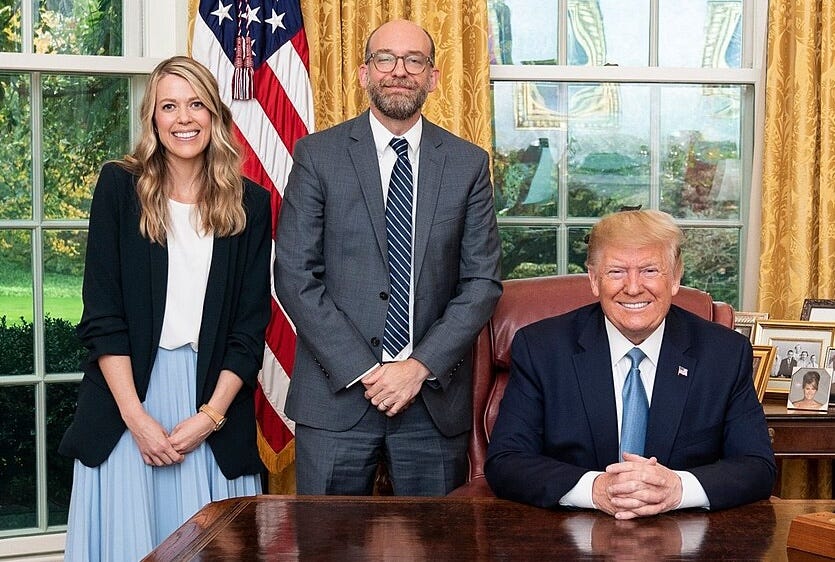Trail Notes
Trump and Musk at War / Budget Bill's Fading Beauty / Tariff Turmoil / Scamming with DOGE / Questionable Trump Campaign Cash / Ken Cen Subscription Crash

Trump and Musk Wage War
Their gut-the-government bromance is over. This week Elon Musk chainsaw-massacred President Trump’s “one big, beautiful bill,” an assault that, not surprisingly, turned into an all-out Trump-Musk war by week’s end.
Elon kicked things off Tuesday, calling Trump’s pet legislation a “disgusting abomination.” On Wednesday, he amped it up, describing it as “debt slavery” and imploring his followers to “fire the politicians who betrayed the American people.”
Trump somehow kept quiet for nearly two whole days, but when asked about Musk’s posts by a reporter Thursday, he said he was “very disappointed in Elon” and claimed the former DOGE czar was upset because the bill would eliminate federal tax credits for electric vehicles, which is all that Musk’s company, Tesla, sells. Musk responded that wasn’t true. He hadn’t had a chance to see what was in the bill, which, he noted, “was passed in the dead of night.”
Then, it got ugly. Trump posted that Musk was “wearing thin” and claimed that he had asked him to leave. He went on to snark that the easiest way to save money in the budget was to “terminate Elon’s Governmental Subsidies and Contracts.”
In response, Musk turned the volume up to 11. “Time to drop the really big bomb,” he tweeted. “@realDonaldTrump is in the [child sex offender Jeffrey] Epstein files. That is the real reason they have not been made public.” He signed off: “Have a nice day, DJT!”
The Budget Bill’s Fading Beauty
Even if Elon Musk had just faded into the woodwork, it would not have been a beautiful week for Trump’s One Big Beautiful Bill Act.
The nonpartisan Congressional Budget Office (CBO) released its projection that the legislation, passed by the House and now before the Senate, will add another $2.4 trillion to the country’s national debt over the next 10 years. Broken down, the tax cuts in the bill would cost $5.3 trillion, which would be partially offset by $2.9 trillion in revenue increases and spending cuts.
Not surprisingly, Republicans dismissed the CBO estimates, which is a congressional tradition when lawmakers don’t agree with it. The CBO also weighed in on the most controversial target of Republican cuts—Medicaid. It estimates the legislation could result in nearly 11 million Americans losing their health insurance in the next decade.
So, in the coming weeks, expect to hear the “fraud, waste and abuse” mantra on a continuous loop. That, congressional Republicans will claim, is their sole focus, and they will insist they are not actually taking healthcare coverage away from anyone. Except, of course, immigrants or people who they suggest are too lazy to work. The spinning is just beginning.
Tales of Tariff Turmoil
One of the more frequent complaints about Donald Trump’s tariff policy is that it’s not a policy. It’s a game of chance. Businesses have to guess what the president will do next, and the uncertainty makes it that much harder for them to develop a long-term strategy.
Trump’s big trade move this week was to raise the tariffs on imported steel and aluminum to 50 percent. The purpose, he said, was to boost U.S. companies. But a more damaging impact will be felt by many American companies that rely on steel and aluminum imports, including home builders, car manufacturers, oil producers and can makers. They likely will have little choice but to raise their prices.
The tariff hikes are also another slap at Canada, the largest foreign supplier of steel and aluminum to the United States. The Canadian Steel Producers Association said the move “essentially closes the U.S. market to our domestic industry.”
Meanwhile, a big stumbling block in the messy trade negotiations between the United States and China is China’s control of most of the world’s rare earths. It may not seem like such a big deal, but they’re a key component of today’s cars and trucks, and U.S. and European companies are running out of them. On April 4, two days after Trump announced his “Liberation Day” across-the-board tariffs that increased tariffs on Chinese goods from 20 percent to 34 percent, China halted exports of seven rare earths and powerful magnets made from them.
One last tariff trickle-down: Proctor & Gamble announced on Thursday that, due to the market uncertainty tied to Trump’s trade war, it plans to lay off 7,000 workers over the next two years.
Scamming with DOGE
It was only a matter of time. A money-raising scam using DOGE as a cover has popped up. According to The Bulwark, a text with the following message was recently sent to Republican donors: “You earned that $5,000 DOGE check. Say YES before it’s gone.” Anyone who clicked the accompanying link then received this response: “DOGE SAVED YOU $1 TRILLION—And YOU SAID NO?” That response was followed by: “Our records show you may have said ‘NO’ to your Trump Savings Check. That can’t be right!”
There is, of course, no Trump Savings Check. Small detail. Recipients of the text were given until midnight to respond with their email address and also asked to donate to a PAC called Women for America’s Freedom (WAF). The Bulwark’s check of Federal Election Commission records showed that WAF took in $370,000 last election cycle but donated only $10,000 to candidates. The remaining 95 percent of its money was listed as going to “operating expenses.”

WAF’s website no longer exists, but according to The Bulwark, it once listed as its president Mary Vought, vice president for strategic communications at the Heritage Foundation and former wife of Project 2025 coauthor Russell Vought, now the director of the Office of Management and Budget. And, at one point, WAF’s advisory committee included White House Press Secretary Karoline Leavitt.
Questionable Donations to Trump
Last month, President Trump told Attorney General Pam Bondi to investigate online political fundraising. He contended that foreigners and fraudsters were using “schemes” and “dummy accounts” to funnel illegal contributions to political campaigns and causes.
Trump singled out ActBlue, the a major Democratic Party fundraising organization. But a recent Associated Press investigation found that about 1,600 donations to Trump in the past five years came from donors who live abroad, have close ties to foreign interests, or failed to disclose basic information, making it impossible to verify if the donations were legal.
A major probe of ActBlue could dramatically hamper Democratic Party fundraising before the midterm elections. Perhaps Bondi should also take a closer look at where her boss got his campaign cash.
DOGE Staffer with Big Oil Ties Given Keys to Interior Department
Elon Musk may have gone away, but DOGE is still hanging on, and some of its minions have burrowed into the federal agencies they were supposedly ridding of fraud, waste and abuse.
Consider the case of an attack DOGE named Tyler Hassen. Although he lacks any public administration experience, he now has the job of reorganizing the Interior Department, which includes the National Park Service, Bureau of Land Management, Fish and Wildlife Service, Bureau of Reclamation, the U.S. Geological Survey, and the Bureau of Indian Affairs.
Hassen’s lack of relevant experience would be alarming enough, but it turns out he’s a former executive with Basin Holdings, which manufactures and sells oil rigs. And, in an apparent violation of government protocol, he hasn’t yet divested his energy investments or filed an ethics commitment to break ties with companies that could present a conflict of interest.
“Drill, Baby Drill” Time in Alaska
On Monday, the Trump administration said it plans to eliminate federal protections for millions of acres of Alaskan wilderness. That would open up the land to drilling and mining. Interior Secretary Doug Burgum said the Biden administration had exceeded its authority last year when it banned oil and gas drilling in more than half of the 23-million-acre area. Alaska, by the way, is warming at a rate two to three times faster than the global average due to climate change, a term that the Trump administration purged from government websites.
No Curtain Call at the Kennedy Center
Since Donald Trump named himself chairman of the Kennedy Center, its subscription sales are down 36 percent, a whopping $1.6 million, from last year.
Randy Rieland is a former columnist at Smithsonian magazine, website director at the Discovery Channel, and senior writer at Washingtonian magazine.
Money Trail is a fiscally sponsored project of the Alternative Newsweekly Foundation, a 501(c)(3) public charity, EIN 30-0100369. Donations are tax-deductible to the extent allowed by law.



